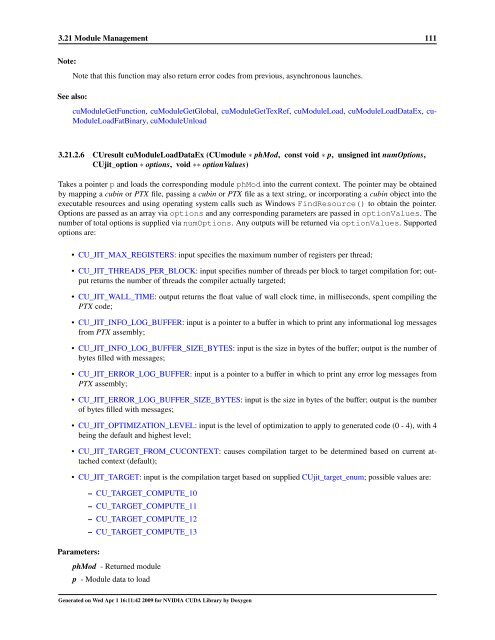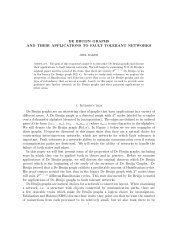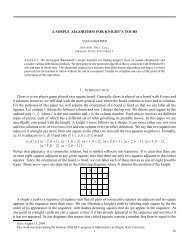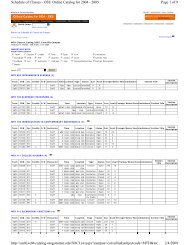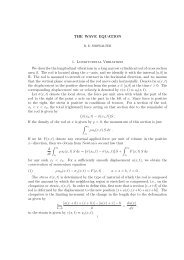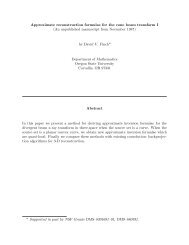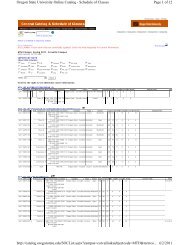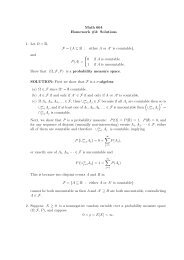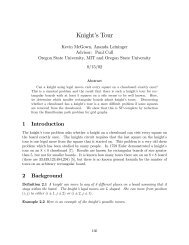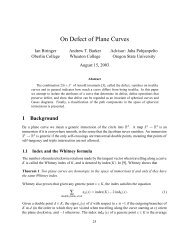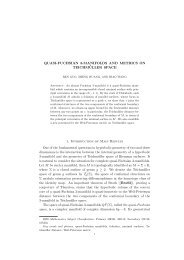- Page 1:
NVIDIA CUDAReference ManualVersion
- Page 4 and 5:
iiCONTENTS3.5 Stream Management . .
- Page 6 and 7:
ivCONTENTS3.10 Direct3D 9 Interoper
- Page 8 and 9:
viCONTENTS3.15.2.2 cudaComputeMode
- Page 10 and 11:
viiiCONTENTS3.24.2.11 cuParamSetv .
- Page 12 and 13:
xCONTENTS3.28.2.3 cuD3D9GetDirect3D
- Page 14 and 15:
xiiCONTENTS4.3.1 Detailed Descripti
- Page 16 and 17:
2 Module IndexGenerated on Wed Apr
- Page 18 and 19:
4 Data Structure IndexGenerated on
- Page 20 and 21:
6 Module Documentation3.2 Thread Ma
- Page 22 and 23:
8 Module DocumentationNote:Note tha
- Page 24 and 25:
10 Module Documentation3.4.2.2 cuda
- Page 26 and 27:
12 Module DocumentationParameters:-
- Page 28 and 29:
14 Module Documentation3.5 Stream M
- Page 30 and 31:
16 Module Documentation3.6 Event Ma
- Page 32 and 33:
18 Module Documentationstart - Star
- Page 34 and 35:
20 Module Documentation3.7 Executio
- Page 36 and 37:
22 Module DocumentationConverts the
- Page 38 and 39:
24 Module DocumentationCopies data
- Page 40 and 41:
26 Module DocumentationNote:See als
- Page 42 and 43:
28 Module Documentationdegrade syst
- Page 44 and 45:
30 Module Documentationextent - Req
- Page 46 and 47:
32 Module DocumentationParameters:p
- Page 48 and 49:
34 Module DocumentationReturns:Note
- Page 50 and 51:
36 Module Documentationdirection of
- Page 52 and 53:
38 Module DocumentationNote:See als
- Page 54 and 55:
40 Module DocumentationcudaMemcpy3D
- Page 56 and 57:
42 Module Documentation3.8.2.24 cud
- Page 58 and 59:
44 Module Documentation3.8.2.27 cud
- Page 60 and 61:
46 Module DocumentationSee also:cud
- Page 62 and 63:
48 Module DocumentationSee also:cud
- Page 64 and 65:
50 Module DocumentationExtents with
- Page 66 and 67:
52 Module DocumentationSee also:cud
- Page 68 and 69:
54 Module Documentation3.10 Direct3
- Page 70 and 71:
56 Module DocumentationpszAdapterNa
- Page 72 and 73:
58 Module Documentation• Resource
- Page 74 and 75: 60 Module DocumentationSee also:cud
- Page 76 and 77: 62 Module DocumentationReturns:Note
- Page 78 and 79: 64 Module DocumentationcudaD3D9Reso
- Page 80 and 81: 66 Module Documentation• cudaErro
- Page 82 and 83: 68 Module DocumentationThis call is
- Page 84 and 85: 70 Module DocumentationParameters:p
- Page 86 and 87: 72 Module DocumentationpResource -
- Page 88 and 89: 74 Module DocumentationcudaD3D10Res
- Page 90 and 91: 76 Module Documentationtex1Dfetch()
- Page 92 and 93: 78 Module Documentationz - Z compon
- Page 94 and 95: 80 Module Documentation3.13 Version
- Page 96 and 97: 82 Module Documentation• template
- Page 98 and 99: 84 Module DocumentationSee also:cud
- Page 100 and 101: 86 Module Documentation3.14.2.8 tem
- Page 102 and 103: 88 Module DocumentationSee also:cud
- Page 104 and 105: 90 Module DocumentationcudaErrorUnm
- Page 106 and 107: 92 Module DocumentationEnumerator:c
- Page 108 and 109: 94 Module Documentation3.16 CUDA Dr
- Page 110 and 111: 96 Module Documentation3.18 Device
- Page 112 and 113: 98 Module Documentation• CU_DEVIC
- Page 114 and 115: 100 Module Documentationtypedef str
- Page 116 and 117: 102 Module Documentation3.19 Versio
- Page 118 and 119: 104 Module DocumentationReturns:Not
- Page 120 and 121: 106 Module DocumentationNote:See al
- Page 122 and 123: 108 Module Documentation3.21 Module
- Page 126 and 127: 112 Module DocumentationnumOptions
- Page 128 and 129: 114 Module Documentation3.22 Stream
- Page 130 and 131: 116 Module Documentation3.23 Event
- Page 132 and 133: 118 Module Documentation3.23.2.4 CU
- Page 134 and 135: 120 Module Documentation3.24 Execut
- Page 136 and 137: 122 Module Documentation3.24.2.3 CU
- Page 138 and 139: 124 Module DocumentationParameters:
- Page 140 and 141: 126 Module DocumentationReturns:Not
- Page 142 and 143: 128 Module Documentation• CUresul
- Page 144 and 145: 130 Module Documentationtypedef enu
- Page 146 and 147: 132 Module Documentationwhere:• W
- Page 148 and 149: 134 Module DocumentationParameters:
- Page 150 and 151: 136 Module DocumentationParameters:
- Page 152 and 153: 138 Module DocumentationFor CUDA ar
- Page 154 and 155: 140 Module DocumentationFor device
- Page 156 and 157: 142 Module DocumentationCUdeviceptr
- Page 158 and 159: 144 Module DocumentationIf dstMemor
- Page 160 and 161: 146 Module DocumentationIf srcMemor
- Page 162 and 163: 148 Module DocumentationcuMemcpy3D,
- Page 164 and 165: 150 Module Documentation3.25.2.18 C
- Page 166 and 167: 152 Module Documentationbytes - Siz
- Page 168 and 169: 154 Module DocumentationNote:See al
- Page 170 and 171: 156 Module DocumentationParameters:
- Page 172 and 173: 158 Module Documentation3.25.2.31 C
- Page 174 and 175:
160 Module Documentationui - Value
- Page 176 and 177:
162 Module Documentation3.26 Textur
- Page 178 and 179:
164 Module DocumentationParameters:
- Page 180 and 181:
166 Module DocumentationParameters:
- Page 182 and 183:
168 Module Documentation3.26.2.12 C
- Page 184 and 185:
170 Module Documentation3.27 OpenGL
- Page 186 and 187:
172 Module Documentation3.27.2.4 CU
- Page 188 and 189:
174 Module Documentation3.28 Direct
- Page 190 and 191:
176 Module DocumentationReturns:Not
- Page 192 and 193:
178 Module Documentation• The pri
- Page 194 and 195:
180 Module DocumentationNote:Note t
- Page 196 and 197:
182 Module DocumentationpHeight - R
- Page 198 and 199:
184 Module DocumentationNote:See al
- Page 200 and 201:
186 Module Documentation3.29.2 Func
- Page 202 and 203:
188 Module Documentation• ID3D10T
- Page 204 and 205:
190 Module DocumentationFor usage r
- Page 206 and 207:
192 Module DocumentationIf pResourc
- Page 208 and 209:
194 Module DocumentationParameters:
- Page 210 and 211:
196 Module DocumentationCUDA_ERROR_
- Page 212 and 213:
198 Module Documentation• typedef
- Page 214 and 215:
200 Module Documentation3.30.2.3 ty
- Page 216 and 217:
202 Module Documentation3.30.3.4 en
- Page 218 and 219:
204 Module Documentation3.30.3.8 en
- Page 220 and 221:
206 Module DocumentationGenerated o
- Page 222 and 223:
208 Data Structure Documentation4.2
- Page 224 and 225:
210 Data Structure Documentation4.3
- Page 226 and 227:
212 Data Structure DocumentationSou
- Page 228 and 229:
214 Data Structure Documentation4.6
- Page 230 and 231:
216 Data Structure Documentation4.7
- Page 232 and 233:
218 Data Structure Documentation4.9
- Page 234 and 235:
220 Data Structure Documentation4.1
- Page 236 and 237:
IndexC++ API Routines, 81Context Ma
- Page 238 and 239:
224 INDEXCUDA_TYPES, 200CUctx_flags
- Page 240 and 241:
226 INDEXCU_FUNC_ATTRIBUTE_MAX_THRE
- Page 242 and 243:
228 INDEXcudaD3D9ResourceSetMapFlag
- Page 244 and 245:
230 INDEXcudaMemcpyToArrayCUDART_ME
- Page 246 and 247:
232 INDEXcudaStream_t, 91CUDART_VER
- Page 248 and 249:
234 INDEXcuMemcpyAtoACUMEM, 147cuMe
- Page 250:
NoticeALL NVIDIA DESIGN SPECIFICATI


